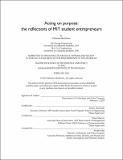Acting on purpose: the reflections of MIT student entrepreneurs
Author(s)
Benkirane, Othmane.
Download1112064388-MIT.pdf (475.1Kb)
Alternative title
Reflections of MIT student entrepreneurs
Other Contributors
Massachusetts Institute of Technology. Institute for Data, Systems, and Society.
Technology and Policy Program.
Advisor
Jinane Abounadi and Fiona Murray.
Terms of use
Metadata
Show full item recordAbstract
The study of social systems has increasingly relied on data collection and analysis to draw conclusions. In parallel, the research community has often tried to understand entrepreneurs quantitatively, e.g. by understanding which behaviours or personality traits most often correlated with entrepreneurial success. While a quantified representation is essential in modeling what is being studied, it hides away the mental processes that create behaviours. Arguably, the people who engage the most directly with systemic change are entrepreneurs. They have to create their own system (a company) and connect it to its wider network (clients, investors, etc.). Most importantly, the more uncommon their idea is, the less they can rely on existing frames to bring their ideas to fruition, and the more they have to reflect on the dynamics of their wider context and how their company can integrate to it. According to constructive-developmental theory (CDT), the ability to see context dynamically is not a personality trait, but a structure of perception. Our meaning-making--how we create that perception of the world--grows in complexity as we delve into our reflections. CDT makes the separation between a structure in which value is defined by the contexts that we are in, and the next more complex one, where the self defines value. This thesis is an early attempt at understanding the experience of systemic change, and the growth in perception that happens along-side it. By bringing CDT and associated theories of the mind into the experience of entrepreneurship, I sought to understand how entrepreneurs make meaning of themselves in the course of their growth, by asking them directly. This is the first known study that maps the meaning-making complexity of entrepreneurs using the subject-object interview, CDT's qualitative empirical research method. I found that, as perception became more intrinsic, the definition of value went from seeking to have what we wish to have, to leaving a legacy through impact, to acting in harmony with our meaning of value. Instead of seeking purpose, entrepreneurs who perceive intrinsically act on the one they already have. Instead of seeking value, they share it with others in all their interactions.
Description
This electronic version was submitted by the student author. The certified thesis is available in the Institute Archives and Special Collections. Thesis: S.M. in Technology and Policy, Massachusetts Institute of Technology, School of Engineering, Institute for Data, Systems, and Society, 2019 Cataloged from student-submitted PDF version of thesis. Vita. Includes bibliographical references (pages [79]-82).
Date issued
2019Department
Massachusetts Institute of Technology. Institute for Data, Systems, and Society; Massachusetts Institute of Technology. Engineering Systems Division; Technology and Policy ProgramPublisher
Massachusetts Institute of Technology
Keywords
Institute for Data, Systems, and Society., Technology and Policy Program.